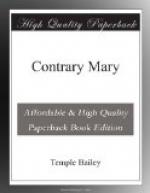“Perhaps I understand,” he said, “because I know what it is to fight—and fail.”
“But you are winning now.” The color swept into her pale cheeks. “Cousin Patty told me.”
“Yes. You showed me the way—I have tried to follow it.”
“Oh, how ignorant I was,” she cried, tempestuously, “when I talked to you of life. I thought I knew everything.”
“You knew enough to help me. If I can help you a little now it will be only a fair exchange.”
It helped her merely to have him there. “You spoke of Barry’s still fighting and winning. Do you think that one goes on fighting?”
“Why not? It would seem only just that he should conquer. There are men who are not tempted, whose goodness is negative. Character is made by resistance against evil, not by lack of knowledge of it. And the judgments of men are not those which count in the final verdict.”
He said more than this, breaking the bonds of her despair. Others had pitied Barry. Roger defended him. She began to think of her brother, not as her imagination had pictured him, flung into utter darkness, but with his head up—his beautiful fair head, a shining sword in his hand, fighting against the powers of evil—stumbling, falling, rising again.
He saw her relax as she listened, and his love for her taught him what to say.
And as he talked, her eyes noted the change in him.
This was not the Roger Poole of the Tower Rooms. This was a Roger Poole who had found himself. She could see it in his manner—she could hear it in his voice, it shone from his eyes. Here was a man who feared nothing, not even the whispers that had once had power to hurt.
The clouds were sweeping toward them, hiding the blue; the wind whirled the dead leaves from the paths, and stirred the budding branches of the hundred-leaved bush—touched with its first hint of tender green. The mist from the fountain was like a veil which hid the mocking face of the bronze boy.
But Mary and Roger had no eyes for these warnings; each was famished for the other, and this meeting gave to Mary, at least, a sense of renewed life.
She spoke of her future. “Constance and Gordon want me to come to them. But I hate to give up my work. I don’t want to be discontented. Yet I dread the loneliness here. Did you ever think I should be such a coward?”
“You are not a coward—you are a woman—wanting the things that belong to you.”
She sat very still. “I wonder—what are the things which belong to a woman?”
“Love—a home—happiness.”
“And you think I want these things?”
“I know it.”
“How do you know?”
“Because you have tried work—and it has failed. You have tried independence—and it has failed. You have tried freedom, and have found it bondage.”
He was once more in the grip of the dream which he had dreamed as he had sat with Mary’s letter in his hand on Cousin Patty’s porch. If she would come to him there would be no more loneliness. His love should fill her life, and there would be, too, the love of his people. She should win hearts while he won souls. If only she would care enough to come.




